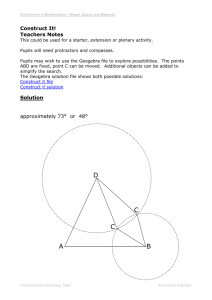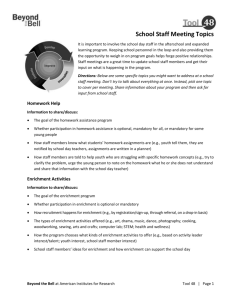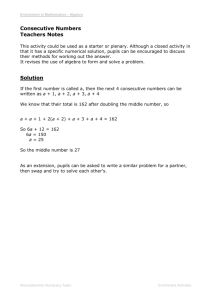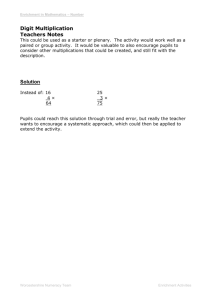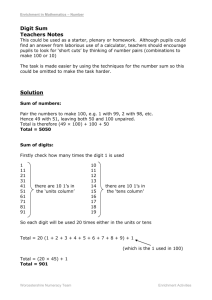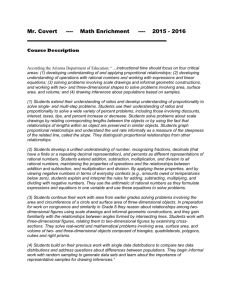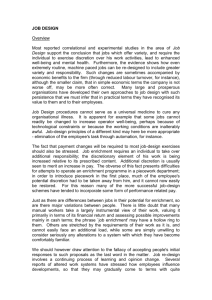General
advertisement
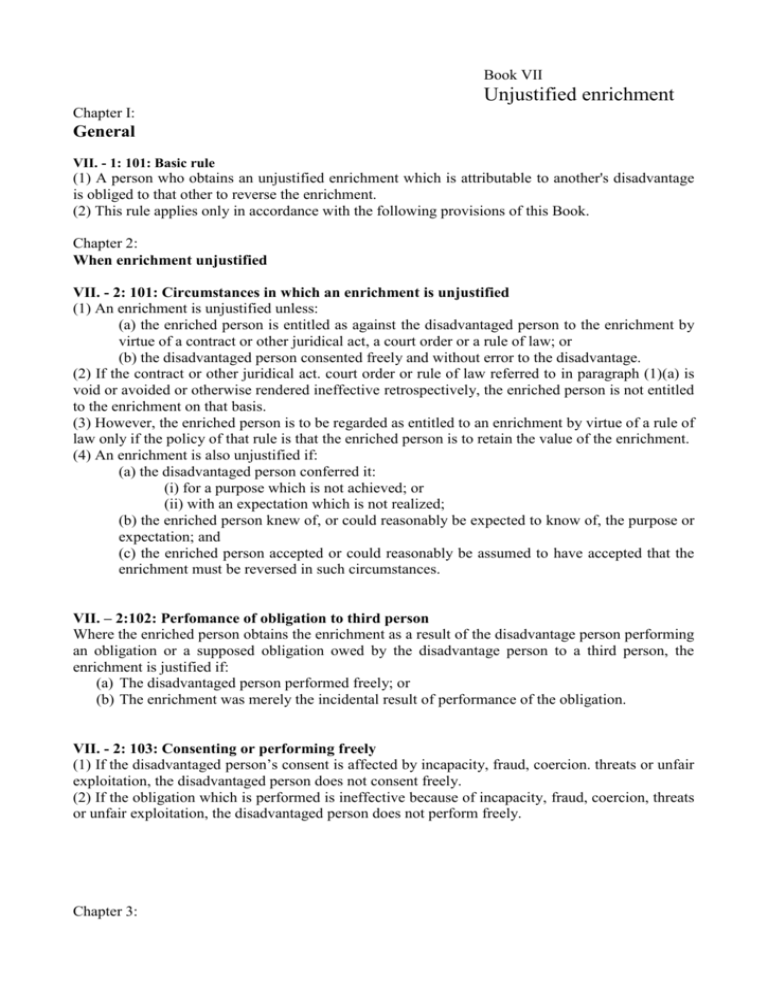
Book VII Unjustified enrichment Chapter I: General VII. - 1: 101: Basic rule (1) A person who obtains an unjustified enrichment which is attributable to another's disadvantage is obliged to that other to reverse the enrichment. (2) This rule applies only in accordance with the following provisions of this Book. Chapter 2: When enrichment unjustified VII. - 2: 101: Circumstances in which an enrichment is unjustified (1) An enrichment is unjustified unless: (a) the enriched person is entitled as against the disadvantaged person to the enrichment by virtue of a contract or other juridical act, a court order or a rule of law; or (b) the disadvantaged person consented freely and without error to the disadvantage. (2) If the contract or other juridical act. court order or rule of law referred to in paragraph (1)(a) is void or avoided or otherwise rendered ineffective retrospectively, the enriched person is not entitled to the enrichment on that basis. (3) However, the enriched person is to be regarded as entitled to an enrichment by virtue of a rule of law only if the policy of that rule is that the enriched person is to retain the value of the enrichment. (4) An enrichment is also unjustified if: (a) the disadvantaged person conferred it: (i) for a purpose which is not achieved; or (ii) with an expectation which is not realized; (b) the enriched person knew of, or could reasonably be expected to know of, the purpose or expectation; and (c) the enriched person accepted or could reasonably be assumed to have accepted that the enrichment must be reversed in such circumstances. VII. – 2:102: Perfomance of obligation to third person Where the enriched person obtains the enrichment as a result of the disadvantage person performing an obligation or a supposed obligation owed by the disadvantage person to a third person, the enrichment is justified if: (a) The disadvantaged person performed freely; or (b) The enrichment was merely the incidental result of performance of the obligation. VII. - 2: 103: Consenting or performing freely (1) If the disadvantaged person’s consent is affected by incapacity, fraud, coercion. threats or unfair exploitation, the disadvantaged person does not consent freely. (2) If the obligation which is performed is ineffective because of incapacity, fraud, coercion, threats or unfair exploitation, the disadvantaged person does not perform freely. Chapter 3: Enrichment and disadvantage VII. -3:101: Enrichment (1) A person is enriched by: (a) an increase in assets or a decrease in liabilities; (b) receiving a service or having work done; or (c) use or another's assets. (2) In determining whether and to what extent a person obtains an enrichment, no regard is to be had to any disadvantage which that person sustains in exchange for or after the enrichment. VII. - 3: 102: Disadvantage (1) A person is advantaged by: (a) a decrease in assets or an increase in liabilities; (b) rendering a service of doing work; or (c) another's use of that person's assets. (2) In determining whether and to what extent a person sustains a disadvantage, no regard is to be had to any enrichment which that person obtains in exchange for or after the disadvantage. Chapter 4: Attribution VII. - 4: 101: Instances of attribution An enrichment is attributable to another's disadvantage in particular where: (a) an asset of that other is transferred to the enriched person by that other; (b) a service is rendered to or work is done for the enriched person by that other; (c) the enriched person uses that other's asset, especially where the enriched person infringes the disadvantaged person's rights or legally protected interests; (d) an asset of the enriched person is improved by that other; or (e) the enriched person is discharged from a liability by that other. VII. -4: 102: Indirect representation Where a representative does a juridical act on behalf of a principal but in such a way that the representative is, but the principal is not, a party to the juridical act, any enrichment or disadvantage of the principal which results from the juridical act, or from a performance of obligations under it, is to be regarded as an enrichment or disadvantage of the representative. VII. -4: 103: Debtor's performance to a non-creditor; onward transfer in good faith (1) An enrichment is also attributable to another's disadvantage where a debtor confers the enrichment on the enriched person and as a result the disadvantaged person loses a right against the debtor to the same or a like enrichment. (2) Paragraph (1) applies in particular where a person who is obliged to the disadvantaged person to reverse an unjustified enrichment transfers it to a third person in circumstances in which the debtor has a defence under VII. -6:101 (Disenrichment). VII. -4: 104: Ratification of debtor's performance to a non-creditor (1) Where a debtor purports to discharge a debt by paying a third person, the creditor may ratify that act. (2) Ratification extinguishes the creditor's right against the debtor to the extent of the payment with the effect that the third person's enrichment is attributable to the creditor's loss of the right against the debtor. (3) As between the creditor and the third person. ratification does not amount to consent to the loss of the creditor's right against the debtor. (4) This Article applies correspondingly to performances of non-monetary obligations. (5) Other rules may exclude the application of this Article if an insolvency or equivalent proceeding has been opened against the debtor before the creditor ratifies. VII. - 4: 105: Attribution resulting from an act of an intervener (1) An enrichment is also attributable to another's disadvantage where a third person uses an asset of the disadvantaged person without authority so that the disadvantaged person is deprived of the asset and it accrues to the enriched person. (2) Paragraph (1) applies in particular where. as a result of an intervener's interference with or disposition of goods, the disadvantaged person ceases to be owner of the goods and the enriched person becomes owner, whether by juridical act or rule of law. VII. -4: 106: Ratification of intervener's acts (1) A person entitled to an asset may ratify the act of an intervener who purports to dispose of or otherwise uses that asset in a juridical act with a third person. (2) The ratified act has the same effect as a juridical act by an authorized representative. As between the person ratifying and the intervener, ratification does not amount to consent to the intervener's use of the asset. VII. - 4: 107: Where type or value not identical An enrichment may be attributable to another's disadvantage even though the enrichment and disadvantage are not of the same type or value. Chapter 5: Reversal of enrichment VII. - 5: 101: Transferable enrichment (1) Where the enrichment consists of a transferable asset, the enriched person reverses the enrichment by transferring the asset to the disadvantaged person. (2) Instead of transferring the asset, the enriched person may choose to reverse the enrichment by paying its monetary value to the disadvantaged person if a transfer would cause the enriched person unreasonable effort or expense. (3) If the enriched person is no longer able to transfer the asset, the enriched person reverses the enrichment by paying its monetary value to the disadvantaged person. (4) However, to the extent that the enriched person has obtained a substitute in exchange, the substitute is the enrichment to be reversed if: (a) the enriched person is in good faith at the time of disposal or loss and the enriched person so chooses; or (b) the enriched person is not in good faith at the time of disposal or loss, the disadvantaged person so chooses and the choice is not inequitable. (5) The enriched person is in good faith if that person neither knew nor could reasonably be expected to know that the enrichment was or was likely to become unjustified. VII. - 5: 102: Non-transferable enrichment (1) Where the enrichment does not consist of a transferable asset, the enriched person reverses the enrichment by paying its monetary value to the disadvantaged person. (2) The enriched person is not liable to pay more than any saving if the enriched person: (a) did not consent to the enrichment; or (b) was in good faith. (3) However, where the enrichment was obtained under an agreement which fixed a price or value for the enrichment, the enriched person is at least liable to pay that sum if the agreement was void or voidable for reasons which were not material to the fixing of the price. (4) Paragraph (3) does not apply so as to increase liability beyond the monetary value of the enrichment. VII. -5:103: Monetary value of an enrichment; saving (1) The monetary value of an enrichment is the sum of money which a provider and a recipient with a real intention of reaching an agreement would lawfully have agreed as its price. Expenditure of a service provider which the agreement would require the recipient to reimburse is to be regarded as part of the price. (2) A saving is the decrease in assets or increase in liabilities which the enriched person would have sustained if the enrichment had not been obtained. VII. - 5: 104: Fruits and use of an enrichment (1) Reversal of the enrichment extends to the fruits and use of the enrichment or, if less, any saving resulting from the fruits or use. (2) However, if the enriched person obtains the fruits or use in bad faith reversal of the enrichment extends to the fruits and use even if the saving is less than the value of the fruits or use. Chapter 6: Defences VII. - 6: 101: Disenrichment (1) The enriched person is not liable to reverse the enrichment to the extent that the enriched person has sustained a disadvantage by disposing of the enrichment or otherwise (disenrichment), unless the enriched person would have been disenriched even if the enrichment had not been obtained. (2) However, a disenrichment is to be dislegarded to the extent that: (a) the enriched person has obtained a substitute; (b) the enriched person was not in good faith at the time of disenrichment, unless: (i) the disadvantaged person would also have been disenriched even if the enrichment had been reversed; or (ii) the enriched person was in good faith at the time of enrichment, the disenrichment was sustained before performance of the obligation to reverse the enrichment was due and the disenrichment resulted from the realisation of a risk for which the enriched person is not to be regarded as responsible; or (c) paragraph (3) of VII. - 5: 102 (Non-transferable enrichment) applies. (3) Where the enriched person has a defence under this Article as against the disadvantaged person as a result of a disposal to a third person, any right of the disadvantaged person against that third person is unaffected. VII. - 6: 102: Juridical acts in good faith with third parties The enriched person is also not liable to reverse the enrichment if: (a) in exchange for that enrichment the enriched person confers another enrichment on a third person; and (b) the enriched person is still in good faith at that time. VII. - 6: 103: Illegality Where a contract or other juridical act under which an enrichment is obtained is void or avoided because of an infringement of a fundamental principle (within the meaning of II -7:301 (Contracts infringing fundamental principles)) or mandatory rule of law, the enriched person is not liable to reverse the enrichment to the extent that the reversal would contravene the policy underlying the principle or rule. Chapter 7: Relation to other legal rules VII. -7: 101: Other private law rights to recover (1) The legal consequences of an enrichment which is obtained by virtue of a contract or other juridical act are governed by other rules if those rules grant or exclude a right to reversal of an enrichment, whether on withdrawal, termination, price reduction or otherwise. (2) This Book does not address the proprietary effect of a right to reversal of an enrichment. (3) This Book does not affect any other right to recover arising under contractual or other rules of private law. VII. -7: 102: Concurrent obligations (1) Where the disadvantaged person has both: (a) a right under this Book to the reversal of an unjustified enrichment; and (b) (i) a right to reparation for the disadvantage (whether against the enriched person or a third party); or (ii) a right to recover under other rules of private law as a result of the unjustified enrichment, the satisfaction of one of the rights reduces the other right by the same amount. (2) The same applies where a person uses an asset of the disadvantaged person so that it accrues to another and under this Book: (a) the user is liable to the disadvantaged person in respect of the use of the asset; and (b) the recipient is liable to the disadvantaged person in respect of the increase in assets. VII. -7: 103: Public law claims This Book does not determine whether it applies to enrichments which a person or body obtains or confers in the exercise of public law functions.

